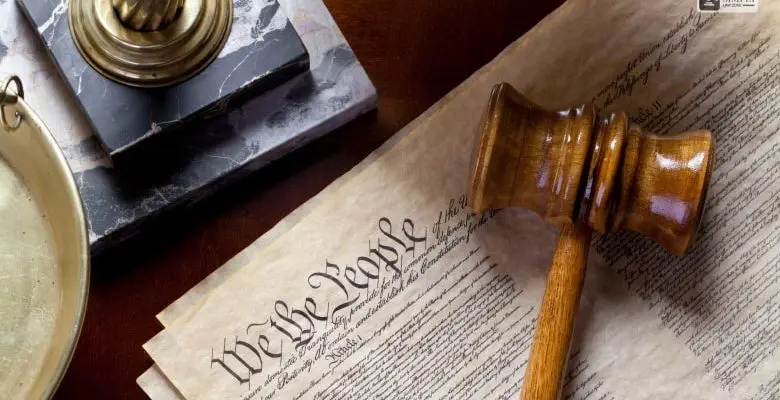
Article Six of the United States Constitution establishes the model behavior of the states and the federal government pertaining to “Debts, Supremacy, Oaths, and Religious Tests.”
This provision talks about all pieces of legislation in the form of treaties, laws, deals, and regulations passed. These laws are obviously made in accordance with the US Constitution, the supreme law of the land.
This Article is known for its remarkably secular nature. It states that any government official of the United States is not to be appointed on the basis of a religious test.
What Is Article 6 Of The US Constitution?
Article 6 of the US Constitution states the following.
All debts incurred and all engagements entered into by the United States before the enactment of the Constitution shall remain valid. |
All laws and treaties made in accordance with the US Constitution are to be the law of the land. The Judges of every Court of law abide by such laws. Any amendment or state law made in contradiction shall be considered void. |
All members of the executive, legislative, and judicial wings of the government shall oath to honor the Constitution of the United States. No member shall, however, be required to work in accordance with a religious text to hold office in the United States. |
The Supremacy Clause

Article 6, clause 2 of the US constitution is referred to as the “supremacy clause.” what is this?. After the Philadelphia Convention was passed in the year 1787, one of the resolutions of the Virginia plan established what is now considered a precursor to the Supremacy Clause.
The plan held that the National legislature should be given utmost power. Any law that stood in contravention of the National Legislature, the Articles of the Union, or any existing treaty is to be declared void.
Instead of vesting Congress with additional powers, Article 6 of the Constitution grants importance to the already existing laws and treaties passed by Congress.
Judicial Review In The Supremacy Clause
Article 6 of the US constitution contains the Supremacy Clause. The Supremacy Clause makes provision for Judicial Review, a powerful weapon of democratic nature. It mandates that any law, treaty, or even verdict made against the existing provisions of law and the Constitution cannot be enacted.
It is thus safe to safe that the Judges of all Courts of Law in the territory of the United States are bound by Constitutional provisions, treaties, and laws of the land.
The Supremacy Clause And Treaties

The Clause takes a very clear stand when it comes to treaties. Unlike the procedure of Great Britain where treaties needed to be enacted locally, Article 6 of the US Constitution lays down different means.
A treaty in force is automatically bounding on all Courts while giving decisions. This provision sees to it that State Legislatures do not endanger international relations of the United States by disregarding any existing treaties.
Revolutionary War And Treaty Breach
Article 4 of the Peace Treaty enacted after the Revolutionary War mandated that no State shall enact any Debtor-relief laws. Several states did that nonetheless. Thus, Great Britain held that its failure to completely withdraw troops from the land can be excused on that ground.
Supremacy Clause And Laws By Congress

Laws passed by Congress are to have the same effect as the treaties. They are rules that the Courts are bound to apply.
In the case of Gibbons v. Ogden(1824), the Supreme Court ruled in favor of a federal permit stating that the Constitution and provisions passed ints accordance are the supreme law of the land.
The Oath Clause
⦿ Federal Legislatures
⦿ State Legislatures
⦿ Executive officers
⦿ Judges
The third clause of Article 6 of the US Constitution has implications for the following.
The aforementioned officials are bound by an oath to serve and respect the Constitution of the United States.
In the case of Ex Parte Garland(1866), the Supreme Court held that an oath cannot contain an ex post facto law. It had the oath mentioned in the case to be invalid as it provided for retroactive punishment by disqualification on the grounds of post offenses.
The No Religious Test Clause.
The no religious test clause stands in support of the oath clause. It holds that no person shall be prevented from holding office under the government of the United States on the grounds of a religious test. This means that a member does not need to qualify as a person practicing a particular religion.
No Religious Test Clause Guarantees Separation Of Church And State

The Separation of Church and State is a concept originating from political jurisprudence. It preserves the Secular character of the Constitution by ensuring a clear distinction between Religious and politically Democratic organizations.
This clause establishes the original intention of the framers of the Constitution.
17th and 18th Century England was witness to various religious test clauses that mandated that in order to hold an office of the government, the members had to be practicing protestants. All Catholics, pagans, and non-conforming protestants were not allowed to be a part of the government.
In the case of Ex Parte Garland, it was held by the Supreme Court that any oath other than mentioned in Article 6 is to be held unconstitutional. The Court has earlier held that forcing government officials to swear by the Oath, even when they are unwilling, is unconstitutional, too.
Earlier, a state’s rights doctrine allowed the state to include any sort of religious test into its Constitution. However, with the inclusion of the Fourteenth Amendment, these religious tests were declared to have no Constitutional foundation.
In the case of Everson v. Board of Education(1947), the landmark judgment provided by the Supreme Court stated that neither the federal nor the state governments could compel any individual to practice any particular religion.
In the case of Silverman v. Campbell(1997), the Supreme Court opined that no law could force a member to make an oath to God.
Why Is Article 6 Of The US Constitution Important?
Article 6 is important for the correct functioning of the US government and economy.
Article 6 Establishes That The Constitution Is The Ultimate Law Of The United States.
This means that any laws or actions taken by the government or the states must according to what is already present in the Constitution. No one, not even the President or Congress, can do anything that goes against the Constitution.
The Article Introduces The Idea Of Federal Supremacy
This means that the federal laws that are made by the national government win the battle against state laws. This does not diminish the importance of state laws. It only means that if there is ever a conflict between a state law and a federal law, the federal law wins. This helps to create consistency and uniformity across the entire country.
“The Supremacy Of Treaties”
This very important article also establishes a very important principle called “the supremacy of treaties”.
Treaties are agreements made with other countries, and the Constitution says they are also part of the supreme law. This means that the U.S. must keep its promises to other nations, and treaties cannot be ignored or broken without consequence.
How Does Article 6 of the U.S. Constitution Play Out In Everyday Life?
This article applies to everyday life. It makes all US citizens, government officials and regular people alike, follow what the Constitution says. It keeps the system fair and unified. Because of it, the laws are more powerful than state laws, so there are consistent rules across the whole nation.
When the U.S. makes agreements with other countries, which are called treaties, Article 6 says that these treaties are just as important as the country’s own laws.
Moreover, Article 6 requires all government officials to support and protect the Constitution when they take position at office. This makes sure that these people in power uphold the principles and values of the nation.
Article 6 also makes it sure that no one can be forced to follow a particular religion just to be part of the government. This means that all government officials have to be must fair and neutral at all times.
Conclusion
Thus, it is safe to say that Article 6 of the US Constitution enjoys its unique status as it establishes important provisions on Debts, ex post facto laws, secularism, oaths, and above all, the supremacy of the Constitution.
The separation of church and state is also a significant aspect of the Article. It has also been argued that the Supremacy Clause often disregards contradictory laws by the state. However, that has been the very essence of the clause itself.
Do let us know if you found this piece on Article 6 of the US Constitution helpful!
Read Also:












